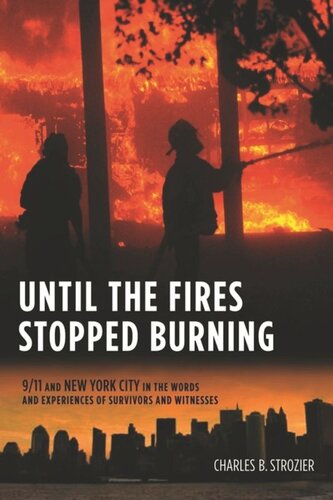

Most ebook files are in PDF format, so you can easily read them using various software such as Foxit Reader or directly on the Google Chrome browser.
Some ebook files are released by publishers in other formats such as .awz, .mobi, .epub, .fb2, etc. You may need to install specific software to read these formats on mobile/PC, such as Calibre.
Please read the tutorial at this link: https://ebookbell.com/faq
We offer FREE conversion to the popular formats you request; however, this may take some time. Therefore, right after payment, please email us, and we will try to provide the service as quickly as possible.
For some exceptional file formats or broken links (if any), please refrain from opening any disputes. Instead, email us first, and we will try to assist within a maximum of 6 hours.
EbookBell Team

4.4
12 reviewsBased on the testimony of survivors, bystanders, spectators, and victims' friends and families, Until the Fires Stopped Burning brings much-needed clarity to the conscious and unconscious meaning of 9/11 and its relationships to historical disaster, apocalyptic experience, unnatural death, and the psychological endurance of trauma. Charles B. Strozier interprets and contextualizes the memories of witnesses, comparing their encounter with 9/11 to the devastation of Hiroshima, Auschwitz, Katrina, and other events. Organizing his study around "zones of sadness" in New York City, Strozier powerfully evokes the multiple places in which his respondents confronted 9/11 while remaining sensitive to the personal, social, and cultural differences of these experiences. Most important, he distinguishes between 9/11 as an apocalyptic event and an apocalyptic experience, which is crucial to understanding the attack's affect on American life and a still-evolving culture of fear in the world.
Charles B. Strozier's college lost sixty-eight alumni in the tragedy of 9/11, and the many courses he has taught on terrorism and related topics since have attracted dozens of survivors and family members. A practicing psychoanalyst in Manhattan, Strozier has also accepted many seared by the disaster into his care. In some ways, the grief he has encountered has felt familiar; in other ways, unprecedented. Compelled to investigate its unique character further, he launched a fascinating study into the conscious and unconscious meaning of the event, both for those who were physically close to the attack and for those who witnessed it beyond the immediate space of Ground Zero.
Based on the testimony of survivors, bystanders, spectators, and victim's friends and families, Until the Fires Stopped Burning brings much-needed clarity to the conscious and unconscious meaning of 9/11 and its relationship to historical disaster, apocalyptic experience, unnatural death, and the psychological endurance of trauma. Strozier interprets and contextualizes the memories of witnesses and compares their encounter with 9/11 to the devastation of Hiroshima, Auschwitz, Katrina, and other events Kai Erikson has called a "new species of trouble" in the world. Organizing his study around "zones of sadness" in New York, Strozier powerfully evokes the multiple places in which his respondents confronted 9/11 while remaining sensitive to the personal, social, and cultural differences of these experiences. Most important, he distinguishes between 9/11 as an apocalyptic event (which he affirms it is not;rather, it is a monumental event), and 9/11 as an apocalyptic experience, which is crucial to understanding the act's affect on American life and a still-evolving culture of fear in the world.